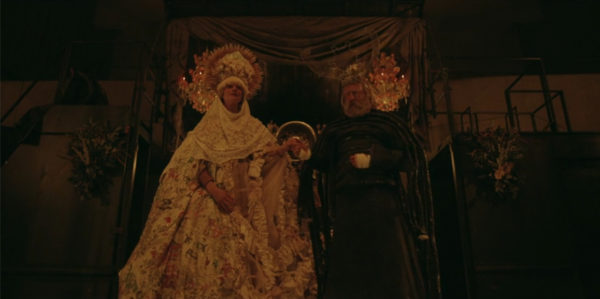
Each week, Joe and Terry review an episode of HBO Max’s dystopian drama Station Eleven, alternating between our respective sites — queerhorrormovies.com and gaylydreadful.com.
Spoilers for episode 10, “Unbroken Circle”
Missed a review? Episodes 1-3 I 4 – 5 I 6 – 7 I 8-9
Plot: Kirsten (Mackenzie Davis) sets in motion her plan to free the Traveling Symphony; Miranda (Danielle Deadwyler) tries to live the right life.
JOE
We’ve reached the end of the road for Station Eleven, Terry, but as the final moments of HBO Max’s miniseries prove, perhaps this is really just a fork in the road?
Joking aside, I’d be lying if I said that I haven’t been putting this off. I resisted watching “Unbroken Circle” for days. Then I cried my way through the finale (from the ~20 minute mark through to the end) and had to give myself another full day to recover before processing my thoughts here with you.
It’s not hyperbole to say that I have responded more to this show than about 90% of the media I’ve consumed in the last year. While it would be easy to suggest that it’s just because it’s about the humanity that emerges in the wake of a devastating pandemic hitting a little close to home, the truth is it’s more than that. Station Eleven is so rich and layered, so emotionally captivating and immaculately written/directed/performed that it proved impossible not to be moved by these ten episodes.
“Unbroken Circle” is the perfect encapsulation of all of these elements, working in tandem to synthesize what makes the show great, while simultaneously paying off every relationship from the series’ run.
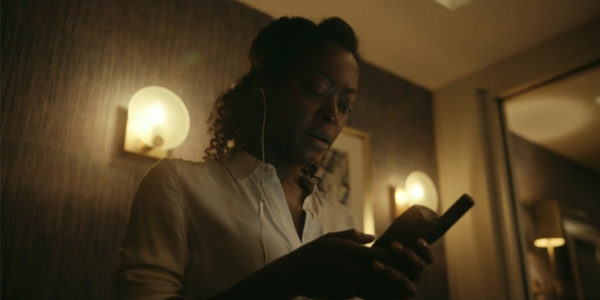
It’s an episode that brings back Danielle Deadwyler’s Miranda, who really only appeared in one episode (episode three “Hurricane”) but who made such an impression that the moment she appeared onscreen I gasped.
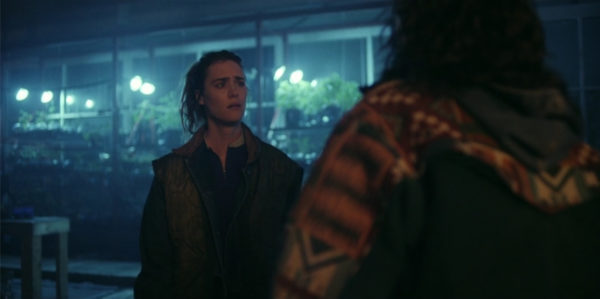
It’s an episode that understands how fundamentally invested audiences are in the Kirsten/Jeevan (Himesh Patel) relationship that it cruelly delays their reunion until the end, then trusts the performances of Davis and Patel to wordlessly convey the weight and impact of those twenty missing years in a tearful hug.
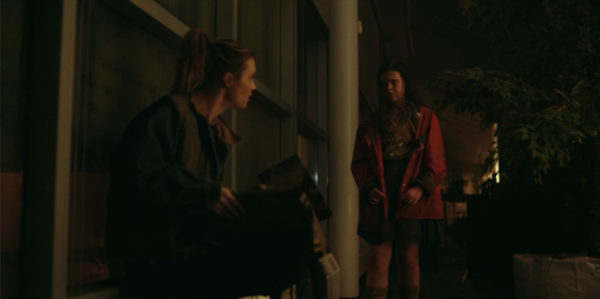
Finally, it’s an episode that understands that the time for violence and/or explosions has passed. Instead there’s a quiet confidence in how writer Patrick Somerville shows a bag of mines carried by one of Tyler (Daniel Zovatto)’s child soldiers…but doesn’t set them off.
There is no dramatic on-stage stabbing of Clark (David Wilmot) or Elizabeth (Caitlin FitzGerald). No storming of the infirmary to rescue Sarah (Lori Petty). In fact, aside from Sarah, the only person who dies is Miranda, whose body is last glimpsed bathed in the golden light of a new day after she works throughout the night to safeguard the Severn City Airport against contaminating pathogens from the infected Gitchegumee flight.
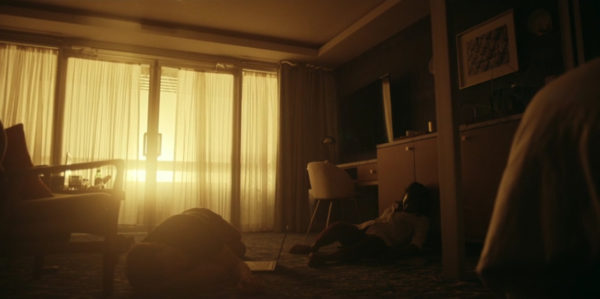
In hindsight, what shone through most for me during “Unbroken Circle” (and partially kept me a blubbering mess) is how, at every junction, characters realize that what they’re fighting for, what they’re dying for, and what they’ve been living twenty years for, is human connection. We started this series fascinated by its obsession with the resilience of art and memory and while both are on display throughout, they’re ultimately revealed to be filters through which to consider the importance of relationships – platonic, familial, and romantic.
The finale has a plot, of course, in that it brings all of our characters together in a single geographical space for the first time. The Traveling Symphony are released from their quarantine and allowed to perform Hamlet for the Severn City Airport residents, who have been waiting decades for Elizabeth to convince Clark to open their doors to the outside world. Tyler has been imprisoned following the explosion of the Museum of Civilization and Clark’s hands are badly burnt. Kirsten is suspicious of Elizabeth’s motives, particularly how the older woman paints herself as a martyr in comparison to the struggle that the people outside have faced.
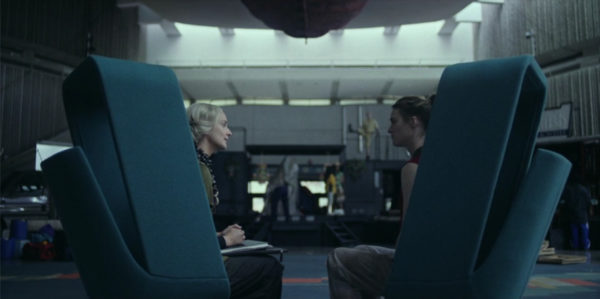
But all of the animosity and distrust falls away when characters begin treating each other with empathy and compassion. Kirsten realizes that Elizabeth and Tyler can only speak to each other through Shakespeare and literally “directs” them to take over the roles of Gertrude and Hamlet. Clark begrudgingly allows the production to ahead in order to reclaim his own acting aspirations and, perhaps more meaningfully, his partner Miles (Milton Barnes) acknowledges that Clark was instrumental in keeping them safe.
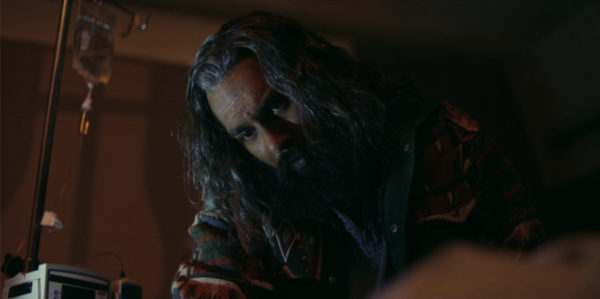
And, naturally, Jeevan arrives to take care of Clark’s injured hands and sit with Sarah as she passes so that she’s not alone (in a scene that is quiet and gently devastating). Because of course Jeevan is the doctor! Fuck me for suggesting last week’s episode was ill-timed; the emotional wallop of seeing him in close proximity to Kirsten left me in such emotional distress that I legitimately ugly cried throughout the entire back half of the episode (I’m actually crying while typing this).
Terry, perhaps I’ll pause here to compose myself. Did you react as emotionally as I did to the finale? Were you expecting a more bombastic resolution and, if so, were you disappointed it didn’t materialize? Did you marvel at how easily Tyler’s family drama translated into Hamlet in a way that even we non-Shakespeare folks could grasp? And since it was one of the elements you most wanted: how great was it to see Miranda return?
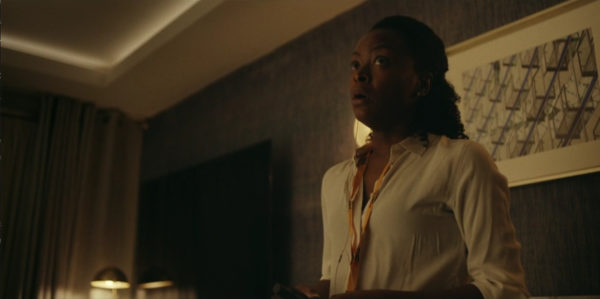
TERRY
The biggest realization I had while watching this episode, Joe, was the full circle moment for Jeevan. It’s something I should have picked up last episode, but didn’t. It was only when Jeevan shows up at The Museum of Civilization and sees the poster for the Traveling Symphony’s production of Hamlet that it connected fully with me. Way back in episode one, we’re introduced to a vastly different Jeevan, sitting in the audience of a production of King Lear. And when Arthur, the person playing Lear, collapses from a heart attack, Jeevan is the first person to leap up to help.
“Are you a doctor?”, he was asked. And no. No, he was not.
But he is now.
I made a note at that point while watching because I thought some tragedy would befall a cast member and he would spring into action, an actual doctor at this point. But of course Station Eleven swerves and upends my expectations. Instead of him saving the day, “Unbroken Circle” just subtly gives us that resolution of a man who once leapt onto a stage to help a dying actor and has now become the person he was always meant to be.
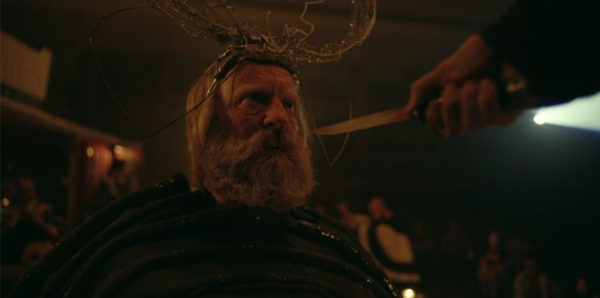
I wasn’t exactly sure what to expect with this episode. “Unbroken Circle” certainly danced around the idea of a more (quite literally) explosive finale with its haunting images of the children of the corn skulking through the darkness just outside of the airport, their bags full of ill intent. I appreciated that their shadowy presence was undercut by Kirsten finding one of them, post performance. This scene, again, is filled with understated menace as we have seen previously what those little bags could do. The way the kid blindly followed The Prophet’s teachings, telling Kirsten that he has lit the torch and “Station Eleven is going to land.” The fear in Kirsten’s eyes is real and she smartly (and luckily) is able to diffuse the situation by showing the kid the actual Station Eleven and reading her the story. It’s a nice thematic nod to the way the series has presented art as a means to heal the world.
But, Joe…I’m not completely satisfied.
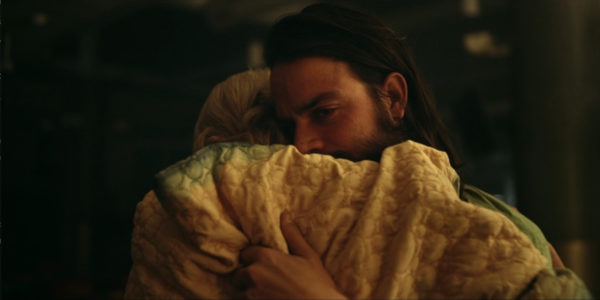
I appreciate that Station Eleven finds salvation for everyone and brings the entire living cast together to collectively heal over the words of Shakespeare. But the show is also doing a helluvalot of hand-waving away the atrocities Tyler has committed, from blowing shit up to running a cult to brainwashing children to be literal suicide bombers. While Station Eleven finds sympathy for the metaphoric devil, Tyler’s character arc feels manufactured and, frankly, disappointing.
I’m not saying he should have died or that “Unbroken Circle” should have ended in violence–I find it rather poetic that a play about tragedy brings everyone a happy ending–but Tyler, out of everyone, seems to have gotten off the easiest. And whatever pain he’s received throughout his 20 years of self-isolation is because of actions he took. Whereas most of the pain suffered by everyone else in this morality story was externally driven…and a lot of it was directly or indirectly because of him.
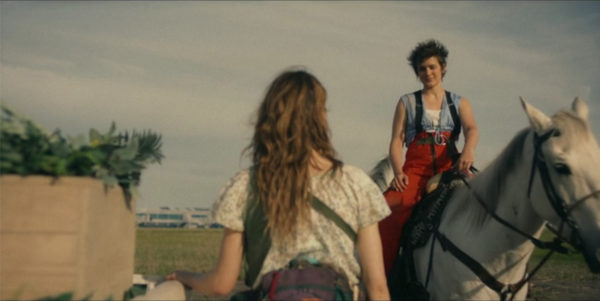
So I don’t quite buy this happy ending of him riding off into the sunset with his mother, his little group of hoodlums and Philippine Velge‘s Alex…(more on that in a second). It felt pat and unsatisfying, particularly given how perfectly executed and charted the rest of the story has been. I’ll even give a mea culpa to the way I reacted to last episode because of the way this episode pays that off in spades.
But Tyler? Dude should have suffered more…and we should have gotten more resolution for the children he’s brainwashed and, let’s be frank, murdered through the power of religion. I get that real life is more complicated and I’m not saying that the story should punish him because it’s the moral thing to do…but the troupe sure does forget that he literally exploded one of their former members, stole children and did a whole lot of horrific things merely days/weeks earlier.
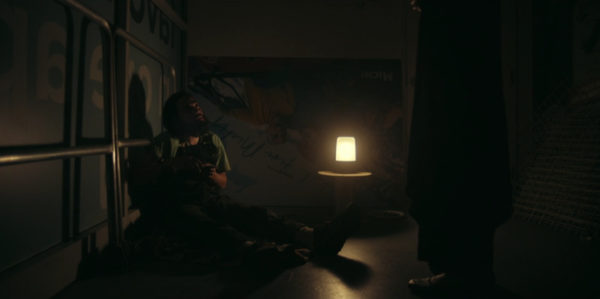
I also think raising the issue of the Red Bandanas now feels completely underbaked. Not having read the novel, I don’t know how they tie in or if their resolution was missing there, as well, but for a force that had been whispered about and was finally seen a few episodes ago…they seem rather frivolous and unneeded for the story. The only mention of them is their rather humorous insertion as crossbow-wielding characters in the production of Hamlet.

All of this negativity aside, I do think that “Unbroken Circle” gives us some incredibly sad and powerful scenes. You’re right that I was hoping/guessing that Miranda would make a reappearance. I could have done with a bit more from her character, but the way she brings the narrative full circle – looking out for Tyler and Clark and all of the people in the Severin City Airport – was a really nice touch. Her creative work lived on and (mostly) inspired generations to come while her physical actions ensured the survival of some of the story’s main characters.

I know this episode was emotional for you, Joe, but the moment that actually got me choked up was the final scene between Kirsten and Jeevan. They’ve both become parents and Station Eleven has constantly contrasted Jeevan’s experiences with Kirsten with Kirsten’s experiences with Alex. The parents are full of fear of the future and potential dangers, while the kids want more from the world. The looming threats of external characters or situations. And then when they meet at the end, they have their first real adult conversation. Kirsten tells him she was never scared with him. “I was always scared,” Jeevan responds. “Met this girl, said I’d walk her home. It’s so cold. She forgot her key.”
And the moment that got me: “You walked her home.”
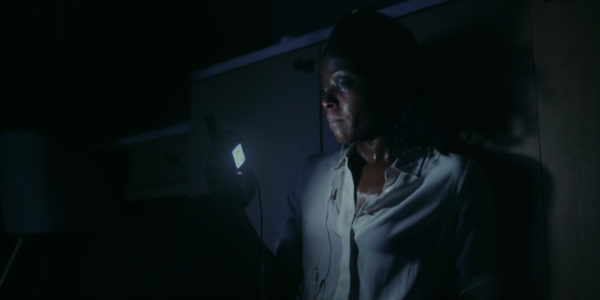
Because, as Miranda has said a few times about logistics: It’s the path things take from A to B. Without Jeevan, she would never have gotten to B. She’s home. The circle is complete. And they take their own paths in life just as the road forks to their own families.
So that’s it, Joe. Any lingering thoughts on the episode? The series as a whole? And what is your series rating for Station Eleven?

JOE
I’ll confess that I was floored by your reaction to this, Terry. Not because I disagree with your criticisms (I don’t at all; they’re completely rational and valid). If nothing else, reading your reaction prompted me to reflect on my own emotional responses, which have – at various times over the course of the pandemic – more often than not felt incongruous with what other people’s.
I guess what I’m saying is that I didn’t expect to be the emotional one and now I’m fascinated by what it is about the series that affected me so deeply.
I could lie and suggest it’s my connection to the source material, but as I said back in our first review, I remember very little else other than the fact that I liked it. Or, sure, it could be the Canadian connection, which almost always resonates strongly with me.
At the end of the day, what really got me is Station Eleven’s artistic similarity to The Leftovers. In hindsight, it’s clear how strongly both series explore the human condition through the lens of cause and effect and fate.
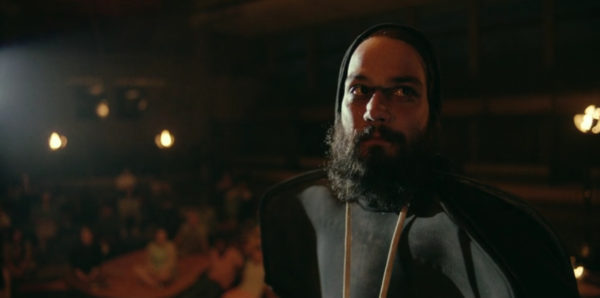
You’re completely right that it is messy, and while the Red Bandanas and Tyler’s redemption arc don’t hold up under a critical lens, I’m willing to forgive them because the emotional impact worked so well. I was so swept up in this series that the little parts that didn’t quite work were rendered immaterial.
This was exciting, mature, complicated and nuanced art at a time when I’ve become increasingly dissatisfied with the simple, mundane nature of a lot of contemporary TV dramas (caveat: genre stuff remains great). Station Eleven stood out as appointment TV for me and between the writing, the performances and the hopeful dystopian visuals, I was thoroughly captivated.
It’s an A- for me.What about you, Terry? Did the finale shave off a letter grade for you? And what will you take away from Station Eleven?
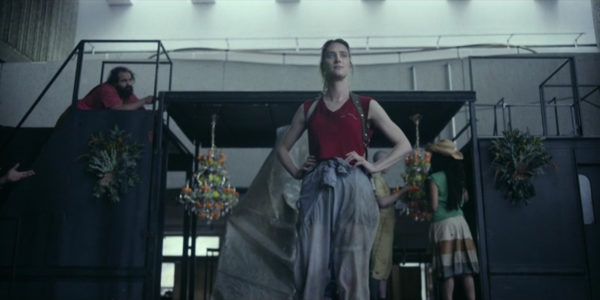
TERRY
It’s weird, Joe. Over the course of the pandemic I’ve been a whole lot more emotional than usual and I find myself connecting with material on a level I typically don’t. It seems easier to make me cry and while the finale didn’t affect me as much as it did you, it still won’t leave my mind.
Releasing Station Eleven during the third year of a pandemic might seem like the wrong decision and yet I’m so glad the show is here. I’ve always looked to the arts as a way of coping with tragedy and heartache and in a situation like a global pandemic, Station Eleven reminds me of the importance of connecting with others. This show has highlighted art as both a way to heal AND a way to destroy. It would have been simple to just focus on the healing aspect of something you and I write about and enjoy on a daily basis, but Station Eleven never takes the easy road.
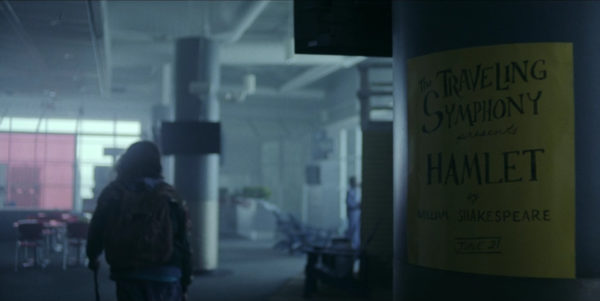
The way Station Eleven tackles authorial intent and the varied way people relate to art shows nuance, even when some of the less important aspects of the narrative might have fallen to the wayside. So, no, the finale didn’t shave a letter grade off for me. It’s an imperfect finale, one that might not satisfy viewers who wanted some kind of narrative finality.
I certainly have issues with the plot aspect of “Unbroken Circle.” But at the end of the day, it’s the feeling that Station Eleven leaves me with that I will remember and focus on. Because Station Eleven helped me contextualize the continued importance of art – whether it’s movies or games or music or novels – in the midst of global catastrophe. And that there’s a need for it, even in our darkest moments.
So while the finale is probably hovering around a B or a B- for me, I cannot disagree with your assessment of the show as a whole. It’s an A- and it’s the balm I didn’t realize I needed.
Station Eleven is now available in its entirety on HBO Max.